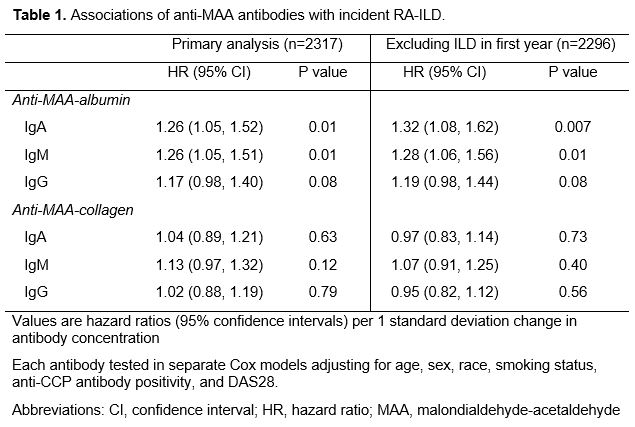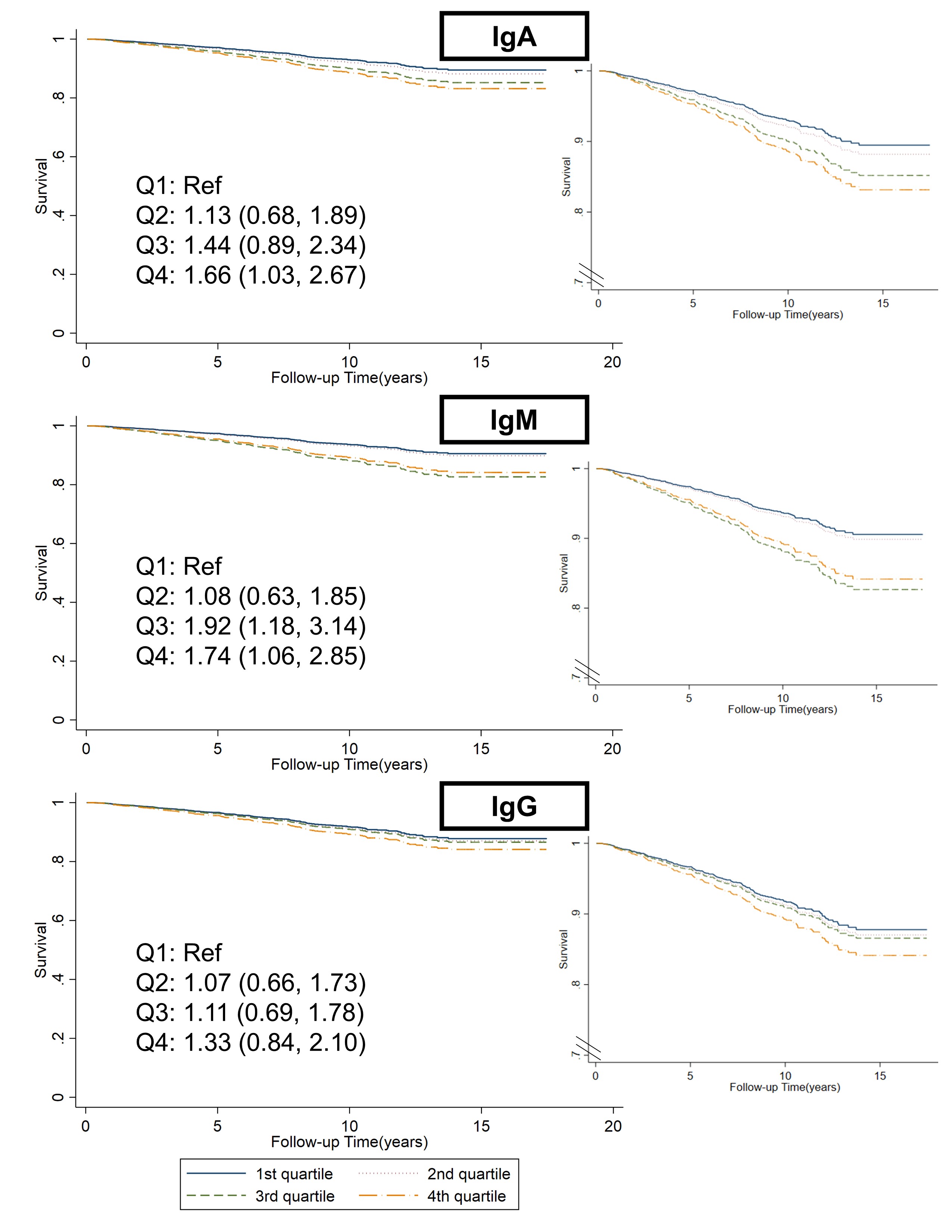Session Information
Date: Tuesday, November 9, 2021
Title: Abstracts: RA – Diagnosis, Manifestations, & Outcomes II: Heart & Lung (1915–1918)
Session Type: Abstract Session
Session Time: 2:15PM-2:30PM
Background/Purpose: Because interstitial lung disease (ILD) causes substantial morbidity and mortality in rheumatoid arthritis (RA), there is a need for methods to facilitate early identification and diagnosis. Peripheral biomarkers including RA-autoantibodies, inflammatory cytokines/chemokines, and tissue remodeling proteins identify patients with established RA-ILD. Less is known, however, whether peripheral biomarkers predict incident RA-ILD. This is particularly relevant as the RA-related autoantibodies, anti-CCP and RF, are not highly predictive of future ILD risk (Natalini JG. Ann Am Thorac Soc 2021). Previously, antibodies to malondialdehyde-acetaldehyde adducts (anti-MAA), a RA-related autoantibody, were found to be closely associated with prevalent RA-ILD (England BR. Arthritis Rheumatol 2019). In this study, we aimed to determine if anti-MAA antibodies were associated with risk of incident RA-ILD.
Methods: We studied participants in the Veterans Affairs Rheumatoid Arthritis registry, a prospective cohort of U.S. Veterans with RA. Patients with RA-ILD at the time of enrollment were excluded. Demographics, smoking status, and RA measures were collected from the registry. We measured anti-MAA antibody concentrations (IgA, IgM, and IgG) by ELISA on banked serum from registry enrollment for both MAA-modified albumin and MAA-modified collagen. Anti-MAA antibody values were log-transformed, standardized, and categorized into quartiles. Incident ILD consisted of ILD diagnoses occurring after registry enrollment, determined through a previously validated approach that included systematic review of medical records for clinical diagnoses, imaging findings, and biopsy reports. In sensitivity analyses, we excluded ILD cases developing ILD within 1 year of enrollment. Multivariable Cox regression models assessed associations of anti-MAA antibody with incident ILD adjusting for age, sex, race, smoking status, anti-CCP antibody positivity, and enrollment DAS28.
Results: Among 2,317 RA patients, 190 developed ILD over 18,044 patient-years of follow-up. Patients were male predominant (90%), with a mean age of 64 years, and had frequent smoking history (79%) and anti-CCP antibody positivity (77%). Higher IgA and IgM anti-MAA-albumin antibody concentrations were associated with an increased risk of incident RA-ILD (Table 1). Effect sizes were smaller for IgG and were not statistically significant. Those with the highest quartiles of IgA and IgM anti-MAA-albumin antibodies had a higher risk of incident ILD (Q4 vs Q1 HR: IgA 1.66 [1.03, 2.67], IgM 1.74 [1.06, 2.85]; Figure 1). In contrast, anti-MAA-collagen antibodies were not significantly associated with incident RA-ILD risk (Table 1). Results were consistent in sensitivity analysis excluding ILD cases occurring in the first year after registry enrollment (Table 1).
Conclusion: Serum anti-MAA-albumin antibodies are associated with a higher risk of developing ILD among RA patients. These findings highlight the role novel autoantibodies may serve in the pathogenesis of RA-ILD as well as support the development of risk models to predict ILD onset.
 Table 1. Associations of anti-MAA antibodies with incident RA-ILD.
Table 1. Associations of anti-MAA antibodies with incident RA-ILD.
 Figure 1. RA-ILD free survival by quartiles of anti-MAA-albumin antibodies. Values hazards ratios (95% confidence intervals) from Cox regression models adjusted for age, sex, race, smoking status, anti-CCP antibody positivity, and DAS28.
Figure 1. RA-ILD free survival by quartiles of anti-MAA-albumin antibodies. Values hazards ratios (95% confidence intervals) from Cox regression models adjusted for age, sex, race, smoking status, anti-CCP antibody positivity, and DAS28.
To cite this abstract in AMA style:
England B, Thiele G, Ascherman D, Duryee M, Hunter C, Yang Y, Roul P, Sayles H, Reimold A, Kerr G, Baker J, Poole J, Mikuls T. Antibodies to Malondialdehyde-Acetaldehyde (MAA) Modified Proteins Predict Incident Rheumatoid Arthritis-Associated Interstitial Lung Disease [abstract]. Arthritis Rheumatol. 2021; 73 (suppl 9). https://acrabstracts.org/abstract/antibodies-to-malondialdehyde-acetaldehyde-maa-modified-proteins-predict-incident-rheumatoid-arthritis-associated-interstitial-lung-disease/. Accessed .« Back to ACR Convergence 2021
ACR Meeting Abstracts - https://acrabstracts.org/abstract/antibodies-to-malondialdehyde-acetaldehyde-maa-modified-proteins-predict-incident-rheumatoid-arthritis-associated-interstitial-lung-disease/
